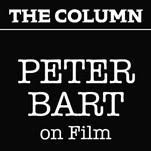Her first film was Booksmart, and her second should have been titled Mediasmart. Instead it’s Don’t Worry Darling, and it’s been a worry from the outset.
Olivia Wilde, the filmmaker/movie star, was born with instant access to media savvy thanks to her accomplished parents — feminist Mom was a congressional candidate, Dad a gifted novelist. But Don’t Worry Darling had its issues from the start. Both its plot and its promotion seemed overly ambitious, its release improbably tied to the Venice Film Festival with its arty fare and fussy critics.
This followed casting disputes during pre-production and flaky antics during post. Wilde’s Booksmart was smart and also fun, but Worry seemed to marry The Truman Show to The Stepford Wives, an uneasy connect.
The media buzz was intense. If it all worked, would Wilde become the next Elaine May? Or would Don’t Worry become her Ishtar?
The opening box office numbers have been promising – almost $20 million in the U.S. with a 66% female audience, half under 25. If Don’t Worry were a hit, would its success refute the theory that only Marvel sub-brands have a chance to overcome the gloom of streamerville?
At a $35 million budget, Don’t Worry was the sort of indie film that studios were avoiding. But given the buzz, was it also destined for wide viewership in its eventual small-screen run?
The critics’ reception was complicated, but even NPR’s pedantic critics tentatively praised Wilde’s “authentic gift.” Other reviewers picked apart its third-act plot convulsions, but in its defense, Harry Styles, its popstar co-star, pointed out, “It’s supposed to be a movie.”
I decided last weekend to see Don’t Worry Darling in its most favorable setting — a theater adjacent to the Palm Springs temples of modernism where it was shot.
The ticket buyers, mostly young and female, seemed hopeful of re-connecting with the convivial overachievers from Booksmart but instead were introduced to Florence Pugh from Lady Macbeth; Chris Pine from Star Trek; and Styles, who not long ago had packed the L.A. Forum.
The plot of Don’t Worry called for the females to be chic and subservient toward the male automatons who paraded off each day to their mysterious office. But not really: The actors were all playing multiple characters in a Fellini-like parade of simulcasts. The only overlap was a black-and-white synchronized dancing scene aimed perhaps at anchoring the audience in a verifiable reality.
“Who is Olivia Wilde trying to become?” asked one of the young moviegoers at my screening. Booksmart suggested the flinty humor of May, whose reputation seemed to coalesce on A New Leaf with Walter Matthau.
But then May responded to the persuasions of Warren Beatty and Dustin Hoffman to make a dark road movie set in the Middle East. The two stars of Ishtar were cast as lovable lounge singers who, it turned out, were devious and narcissistic. The laughs were lost in a confusing plot involving the CIA and a Mideast revolution.
A prickly performer who left a trail of litigation at Paramount over editing disagreements, and also disliked dealing with the media, May nonetheless could afford a high-profile flop like Ishtar. She’d established a brilliant comedic presence working with Mike Nichols.
But Wilde‘s cinematic identity seems more ambiguous in the wake of Don’t Worry Darling — a confusion compounded by the Instagram ubiquity of her co-stars.
The tyranny of the social media may hype opening-weekend box office results, but does it subtly undermine the professional stature of filmmakers?

